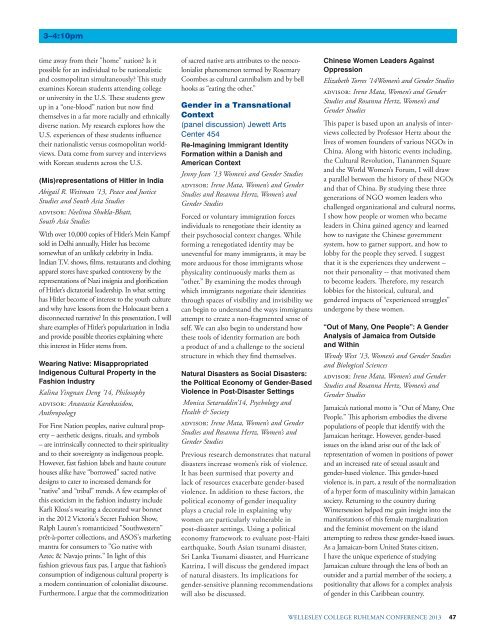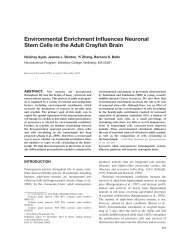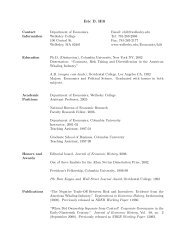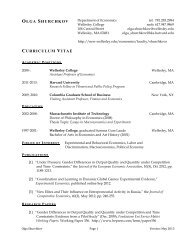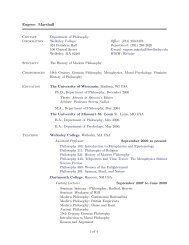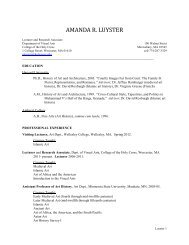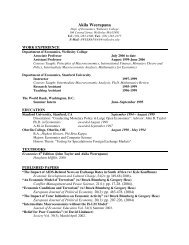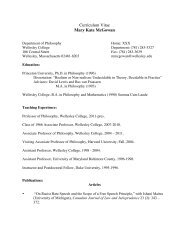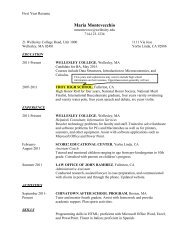Complete Conference Program - Wellesley College
Complete Conference Program - Wellesley College
Complete Conference Program - Wellesley College
You also want an ePaper? Increase the reach of your titles
YUMPU automatically turns print PDFs into web optimized ePapers that Google loves.
3–4:10pm<br />
time away from their "home" nation? Is it<br />
possible for an individual to be nationalistic<br />
and cosmopolitan simultaneously? This study<br />
examines Korean students attending college<br />
or university in the U.S. These students grew<br />
up in a “one-blood” nation but now find<br />
themselves in a far more racially and ethnically<br />
diverse nation. My research explores how the<br />
U.S. experiences of these students influence<br />
their nationalistic versus cosmopolitan worldviews.<br />
Data come from survey and interviews<br />
with Korean students across the U.S.<br />
(mis)representations of Hitler in India<br />
Abigail R. Weitman ’13, Peace and Justice<br />
Studies and South Asia Studies<br />
AdvisoR: Neelima Shukla-Bhatt,<br />
South Asia Studies<br />
With over 10,000 copies of Hitler’s Mein Kampf<br />
sold in Delhi annually, Hitler has become<br />
somewhat of an unlikely celebrity in India.<br />
Indian T.V. shows, films, restaurants and clothing<br />
apparel stores have sparked controversy by the<br />
representations of Nazi insignia and glorification<br />
of Hitler’s dictatorial leadership. In what setting<br />
has Hitler become of interest to the youth culture<br />
and why have lessons from the Holocaust been a<br />
disconnected narrative? In this presentation, I will<br />
share examples of Hitler’s popularization in India<br />
and provide possible theories explaining where<br />
this interest in Hitler stems from.<br />
Wearing Native: misappropriated<br />
Indigenous Cultural Property in the<br />
fashion Industry<br />
Kalina Yingnan Deng ’14, Philosophy<br />
AdvisoR: Anastasia Karakasidou,<br />
Anthropology<br />
For First Nation peoples, native cultural property<br />
– aesthetic designs, rituals, and symbols<br />
– are intrinsically connected to their spirituality<br />
and to their sovereignty as indigenous people.<br />
However, fast fashion labels and haute couture<br />
houses alike have “borrowed” sacred native<br />
designs to cater to increased demands for<br />
“native” and “tribal” trends. A few examples of<br />
this exoticism in the fashion industry include<br />
Karli Kloss's wearing a decorated war bonnet<br />
in the 2012 Victoria's Secret Fashion Show,<br />
Ralph Lauren's romanticized "Southwestern"<br />
prêt-à-porter collections, and ASOS's marketing<br />
mantra for consumers to "Go native with<br />
Aztec & Navajo prints." In light of this<br />
fashion grievous faux pas, I argue that fashion’s<br />
consumption of indigenous cultural property is<br />
a modern continuation of colonialist discourse.<br />
Furthermore, I argue that the commoditization<br />
of sacred native arts attributes to the neocolonialist<br />
phenomenon termed by Rosemary<br />
Coombes as cultural cannibalism and by bell<br />
hooks as “eating the other.”<br />
Gender in a Transnational<br />
Context<br />
(panel discussion) Jewett Arts<br />
Center 454<br />
Re-Imagining Immigrant Identity<br />
formation within a Danish and<br />
American Context<br />
Jenny Jean ’13 Women’s and Gender Studies<br />
AdvisoR: Irene Mata, Women’s and Gender<br />
Studies and Rosanna Hertz, Women’s and<br />
Gender Studies<br />
Forced or voluntary immigration forces<br />
individuals to renegotiate their identity as<br />
their psychosocial context changes. While<br />
forming a renegotiated identity may be<br />
uneventful for many immigrants, it may be<br />
more arduous for those immigrants whose<br />
physicality continuously marks them as<br />
“other.” By examining the modes through<br />
which immigrants negotiate their identities<br />
through spaces of visibility and invisibility we<br />
can begin to understand the ways immigrants<br />
attempt to create a non-fragmented sense of<br />
self. We can also begin to understand how<br />
these tools of identity formation are both<br />
a product of and a challenge to the societal<br />
structure in which they find themselves.<br />
Natural Disasters as Social Disasters:<br />
the Political economy of Gender-Based<br />
Violence in Post-Disaster Settings<br />
Monica Setaruddin’14, Psychology and<br />
Health & Society<br />
AdvisoR: Irene Mata, Women’s and Gender<br />
Studies and Rosanna Hertz, Women’s and<br />
Gender Studies<br />
Previous research demonstrates that natural<br />
disasters increase women’s risk of violence.<br />
It has been surmised that poverty and<br />
lack of resources exacerbate gender-based<br />
violence. In addition to these factors, the<br />
political economy of gender inequality<br />
plays a crucial role in explaining why<br />
women are particularly vulnerable in<br />
post-disaster settings. Using a political<br />
economy framework to evaluate post-Haiti<br />
earthquake, South Asian tsunami disaster,<br />
Sri Lanka Tsunami disaster, and Hurricane<br />
Katrina, I will discuss the gendered impact<br />
of natural disasters. Its implications for<br />
gender-sensitive planning recommendations<br />
will also be discussed.<br />
Chinese Women leaders Against<br />
oppression<br />
Elizabeth Torres ’14Women’s and Gender Studies<br />
AdvisoR: Irene Mata, Women’s and Gender<br />
Studies and Rosanna Hertz, Women’s and<br />
Gender Studies<br />
This paper is based upon an analysis of interviews<br />
collected by Professor Hertz about the<br />
lives of women founders of various NGOs in<br />
China. Along with historic events including,<br />
the Cultural Revolution, Tiananmen Square<br />
and the World Women’s Forum, I will draw<br />
a parallel between the history of these NGOs<br />
and that of China. By studying these three<br />
generations of NGO women leaders who<br />
challenged organizational and cultural norms,<br />
I show how people or women who became<br />
leaders in China gained agency and learned<br />
how to navigate the Chinese government<br />
system, how to garner support, and how to<br />
lobby for the people they served. I suggest<br />
that it is the experiences they underwent –<br />
not their personality -- that motivated them<br />
to become leaders. Therefore, my research<br />
lobbies for the historical, cultural, and<br />
gendered impacts of “experienced struggles”<br />
undergone by these women.<br />
“out of many, one People”: A Gender<br />
Analysis of Jamaica from outside<br />
and Within<br />
Wendy West ’13, Women’s and Gender Studies<br />
and Biological Sciences<br />
AdvisoR: Irene Mata, Women’s and Gender<br />
Studies and Rosanna Hertz, Women’s and<br />
Gender Studies<br />
Jamaica’s national motto is “Out of Many, One<br />
People.” This aphorism embodies the diverse<br />
populations of people that identify with the<br />
Jamaican heritage. However, gender-based<br />
issues on the island arise out of the lack of<br />
representation of women in positions of power<br />
and an increased rate of sexual assault and<br />
gender-based violence. This gender-based<br />
violence is, in part, a result of the normalization<br />
of a hyper form of masculinity within Jamaican<br />
society. Returning to the country during<br />
Wintersession helped me gain insight into the<br />
manifestations of this female marginalization<br />
and the feminist movement on the island<br />
attempting to redress these gender-based issues.<br />
As a Jamaican-born United States citizen,<br />
I have the unique experience of studying<br />
Jamaican culture through the lens of both an<br />
outsider and a partial member of the society, a<br />
positionality that allows for a complex analysis<br />
of gender in this Caribbean country.<br />
WELLESLEY COLLEGE RUHLMAN CONFERENCE 2013 47


